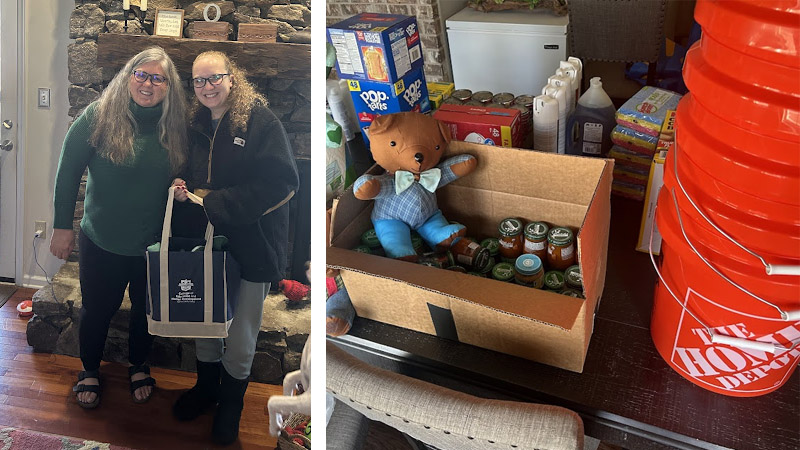
Above: Dr. Laura Greenlee, an A&M-Central Texas professor working remotely from North Carolina, and Ashley Haisler, a student in the counseling and psychology department, and donated materials for hurricane victims.
In the last month of the Fall 2024 semester, when most students are focused on studying for final exams, completing assignments, or just wrapping up the last few tasks before their winter break, the last thing on their minds is taking on another project.
Maybe in some places. In fact, maybe in a lot of places. But, for the undergraduate and graduate students in A&M-Central Texas’ Counseling and Psychology department, neither the impending end of semester pileup nor the calendar mattered. What did matter, they say, is that a hurricane had wreaked havoc on communities in North Carolina, families were still in crisis, and they had made up their minds that they wanted to help. Spearheading the effort was graduate student Ashley Haisler, who approached the student organizations in the department with her plan.
Haisler says that it all began when she and her boyfriend, currently stationed at Fort Cavazos, were discussing the possibility of returning to North Carolina for a visit. She would go, she told him, but only if they brought with them a truckload of donations for those left in need by Hurricane Helene.
To assist with gathering donations, the two student groups Haisler approached embraced the challenge: the Psychology Club and Psi Chi, a psychology honor society. According to Andria Schwegler, Ph.D., Associate Professor and department chair, both clubs function like one entity, partnering and purposefully building a culture of mutual support and connectedness.
“Our student clubs join forces because we can achieve more together,” she explained. “Too, we have students enrolled in courses on campus and online with some living far from the university, so our students, staff, and faculty have embraced finding ways to make sure that all students are included, supported, and active in activities regardless of how they attend class or where they live.”
Both student groups accepted shared responsibility for collecting donations throughout the community which flowed in from Fort Cavazos and local businesses as well. Students were kept busy unloading, storing, and packing items that filled the donation boxes located around the A&M-Central Texas campus. In total, they collected proceeds which, they say, were hundreds of pounds of personal hygiene items, clothes and blankets, water, canned goods, and even pet food.
Psi Chi President Amanda Swayer says it is a good example of just how well the two groups work together – not just on this project, but on everything. She expressed her gratitude to everyone who made contributions.
But there was an unexpected blessing: a lesson, perhaps, reflecting the importance of the online and in-person community that they had been building. One thousand miles later, when Haisler and her boyfriend arrived in North Carolina, they met one of their own professors in the Counseling and Psychology department, Laura Greenlee, Ph.D., an adjunct faculty member working remotely from North Carolina since 2019.
The irony is not lost on Greenlee, but neither is she surprised that A&M-Central Texas students took on such a big task with equal parts empathy and determination.
“It was really touching that they were thinking about not just me but thinking of us in this area, and we are still amid big cleanup here," Dr. Greenlee said.
Though the students initially had no idea that they would be helping one of their own, they immediately expanded collection efforts when they discovered that Dr. Greenlee had taken shelter dogs into her home when the storm would have otherwise made them homeless. This discovery resulted in hundreds of pounds of dog and cat food donations to support the pets impacted by the storm as well.
As a long-time faculty member in the department, Schwegler notes its importance in the traditional sense: training new students in their chosen profession, improved mental health access for the community, region, and state, and the on-going work of those who have already graduated and who have pursued careers as licensed professional counselors, therapists, and psychologists.
In the last 15 years, she adds, and for decades before, counseling and psychology have been cornerstone programs at A&M-Central Texas. Today, in a new and very real sense, limitations on the scope of the impact students and graduates can make have eroded.
“Given that we now live, learn, and work in a globally connected world, places that once seemed far away are closer to home than we may initially realize,” Schwegler said.
